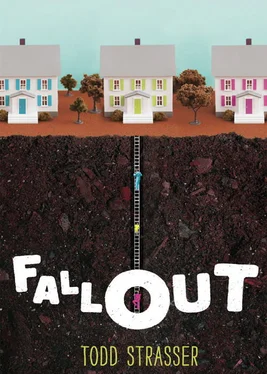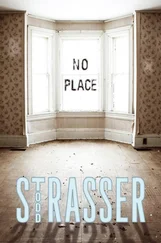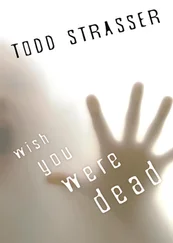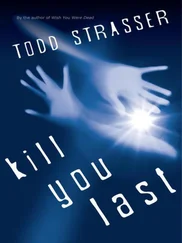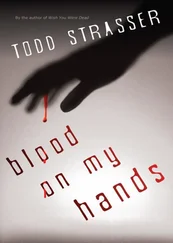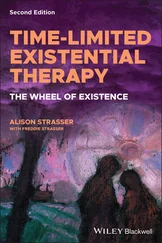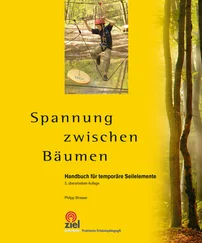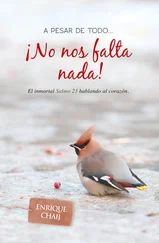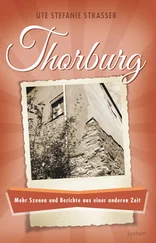We’re alive.
Squawking and honking comes from overhead. A V of black-and-white Canada geese flies high above us.
“From up north,” Mr. McGovern says.
“Look.” Mr. Shaw points behind us. In the distance a thin column of white smoke rises almost straight up into the air.
“Other people,” Dad says.
We’re not the only ones.
But now Dad’s looking back into the playroom with a stricken expression. He closes his eyes as if he wishes he couldn’t see.
Mrs. Shaw takes his arm. “It’s horrible, but we all couldn’t have survived, Richard.”
It’s strange that she’s the one who says it. Dad nods slowly as if he knows she’s right, but it still doesn’t make him feel better. He turns to Mr. Shaw and Mr. McGovern. “We have to give them a proper burial.”
The others agree. Paula tugs at her father’s hand as if there’s something he needs to do. “Daddy?”
“Yes, honey, in a second,” Mr. McGovern says, and steps closer to Dad. “Steven, I…” He trails off and swivels his head at Janet, who looks away. Paula’s father turns back to Dad. “I’m sorry. We all made mistakes…. Would you watch Paula for me? There are things I need to do.”
Dad nods. Mr. McGovern heads off, around our house, toward his own.
Mr. Shaw extends his hand. “Thank you, Richard.”
They shake.
“See you in the morning?” Dad asks, tilting his head toward our playroom.
“Yes, definitely.”
Mrs. Shaw gives Dad a hug, and Ronnie shakes his hand, then looks at me and moves his lips as if to say, See you later. He joins his parents, and they walk across Old Lady Lester’s backyard toward their home.
Dad turns to Janet. “It’s going to be dark soon. If you can wait until tomorrow, I promise that as soon as we finish what we have to do here, we’ll help you look for your children.”
“Thank you, Mr. Porter,” Janet answers.
When Dad turns to me next and places his hands on my shoulders, it catches me by surprise. He turns me to face him. “Scott, I’m proud of you. It was terrible down there, and you conducted yourself like a man.”
I don’t know what to say. Dad smiles and says we should go inside, where he’ll make a fire and heat water so we can wash and cook some food. He leads Mom toward the house. Janet and Paula go with him, and I begin to follow, then stop and look back.
Amid the broken branches, torn shingles, and ripped screens, Sparky’s on his toes with his arms spread out, spinning around and around on the scorched grass, laughing.
I can’t help but smile. What a kid.
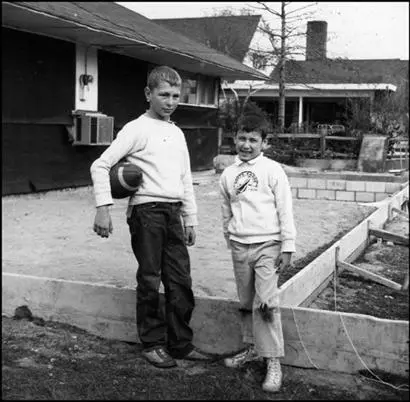
The author, age twelve, with his younger brother, Leigh, standing in front of their family’s below-ground bomb shelter, 1962. A playroom and bedroom would soon be build over the shelter.
The one-story ranch house looks smaller than I remember. The white pine in the front yard that I used to climb as a boy looms a dozen feet higher than the roof. The locust tree I helped my father plant fifty years ago is now almost as tall as the pine. The front lawn, which once felt so expansive, now looks hardly large enough for a game of tag.
The home’s current owner invites me in. The slate floor in the living room has been replaced with carpeting, and the kitchen has been modernized. As we walk down the hall toward the back of the house, I am flooded with memories — the games my brother and I played, the fights, the chases, the nooks and crannies we hid in for hide-and-seek.
At the back of the house, where the playroom once was, there is now a short hall and two smaller bedrooms. We go into the first bedroom — decorated in pink, a color virtually nonexistent in the male-dominated home of my childhood — and the owner opens a closet door. He clears away some shoes and dolls from the carpeted floor. “Listen.” He raps the carpet with his knuckles, producing a dull, echoing clang. “We never had it removed.”
He means the metal trapdoor. He can’t show it to me without pulling up the carpet, but it evokes a memory just the same — of the Cuban Missile Crisis and the years after, when the threat of nuclear war had diminished, and the trapdoor practically vanished under toys and balls and other sports equipment.
The trapdoor has been permanently sealed. No one will ever open it and climb down, as I did as a teenager to show my friends the shelter. Instead there is an outside entrance to the shelter now, and, as the owner leads me out to the backyard, he asks me about the stories the neighbors told him when he and his family moved in twenty years ago.
Is it true that before he had the shelter built, my father had a twelve-foot fence erected around the property so that no one would be able to see in? No, I tell him, that’s not true. Besides, building a fence would have only invited questions and scrutiny.
Was it true that building the shelter took every spare cent my family had, and as a result we had to forgo vacations, dinners out, and other leisure activities? While I was not privy to my family’s finances as a child, it’s doubtful. I recall that we vacationed on Cape Cod and skied in Vermont, and we went to Chinese and Italian restaurants.
In the backyard, except for one large weeping willow, the trees I remember are gone. Here concrete steps lead to a subterranean wooden door. Before we descend, the owner tells me the story of having this entrance built: after inspecting the shelter from the inside, the contractor estimated that the job of digging the new outside entrance would take no more than three or four days. At first the digging went quickly, but when the workers started to break through the cinder-block concrete wall, they found something unexpected — an interior lining of quarter-inch-thick iron plating.
A welder had to be brought in to cut through the iron with an acetylene torch, and when this was done, there was yet another surprise — on the other side of the iron plating was a second wall of cinder blocks.
“Your father really wanted to protect you,” the owner says as he leads me down the entrance steps.
I wish I could say that once inside the shelter, old, forgotten memories were unearthed, but almost everything down there is different now. The bunks and wooden shelves of supplies are gone, replaced with metal file cabinets. The overhead water tank has been removed, and a dehumidifier hums in one corner. The steel ventilator still pokes out of the wall, but the crank is missing.
Holding a flashlight, the owner leads me around the shield wall and into the narrow corridor beneath the trapdoor. The rungs in the wall are still there, shrouded in spiderwebs. The owner offers an unnecessary apology for the webs, saying he rarely comes down to the shelter anymore, and it has been many years since he’s looked on this side of the shield wall.
Later, we leave the shelter and I thank him for allowing me to visit. I get in my car, drive past a few houses, and stop at the top of the hill for which the street is named. Lining the curb are the houses of my childhood friends and neighbors, a few unchanged, but others almost unrecognizable thanks to redesign and renovation. Here my thoughts are once again filled with the memories — of baseball and football games we played on this street, of the Good Humor Man’s ringing bells and how we’d all run home to beg our mothers for quarters for ice cream, of playing in piles of leaves, splashing in puddles, and building snowmen. Ours were truly innocent childhoods.
People say that the era of post–World War II American innocence died on November 22, 1963, with the assassination of President John F. Kennedy. But I wonder if perhaps that innocence began to fade earlier than that, with the Cold War nuclear arms race and the threat of mutually assured destruction. Certainly that was the first time my friends and I became aware that there were countries thousands of miles away, on the other sides of vast oceans, that wanted to destroy us. Countries populated by people we didn’t know, had never met, and had no reason to dislike.
Читать дальше
